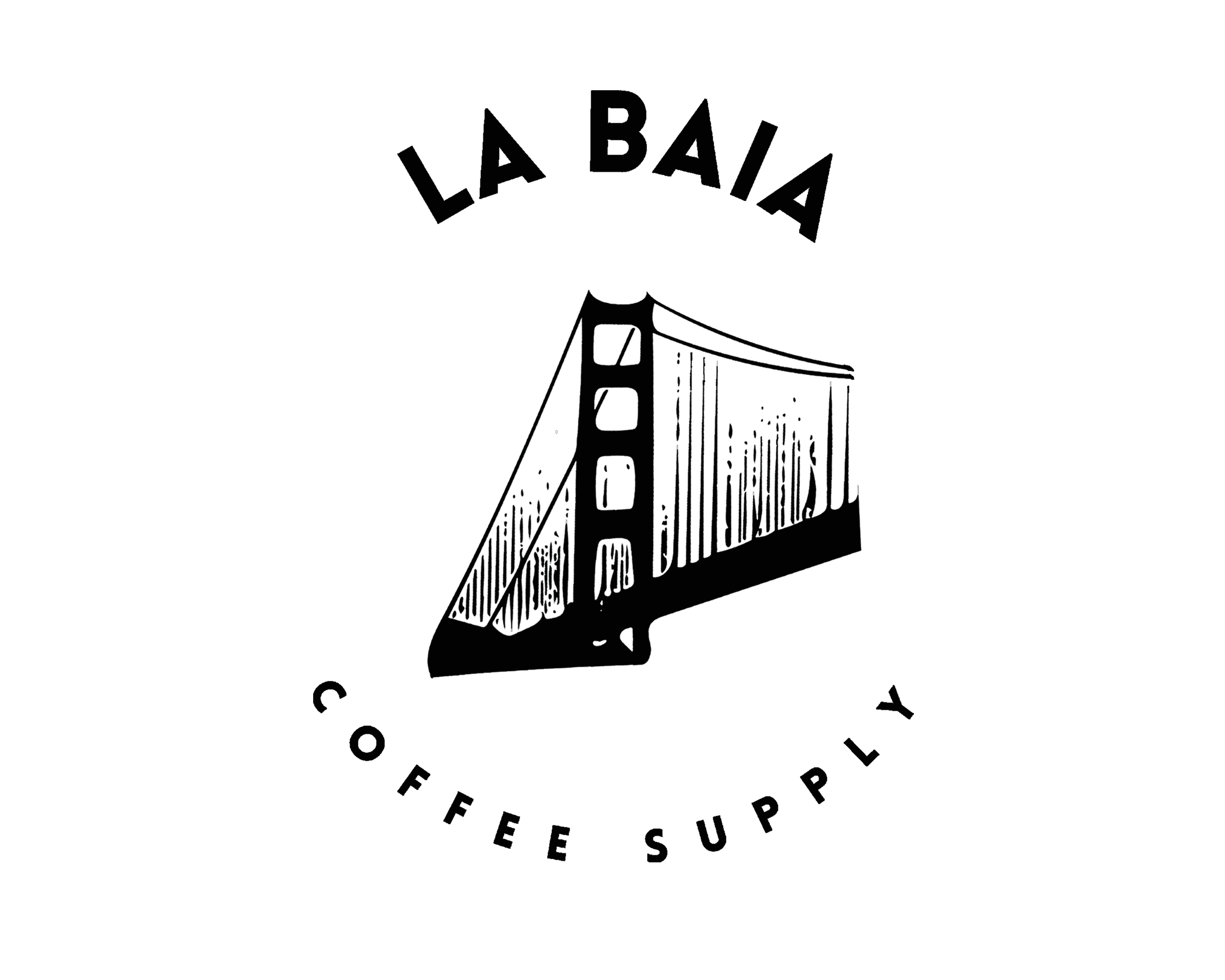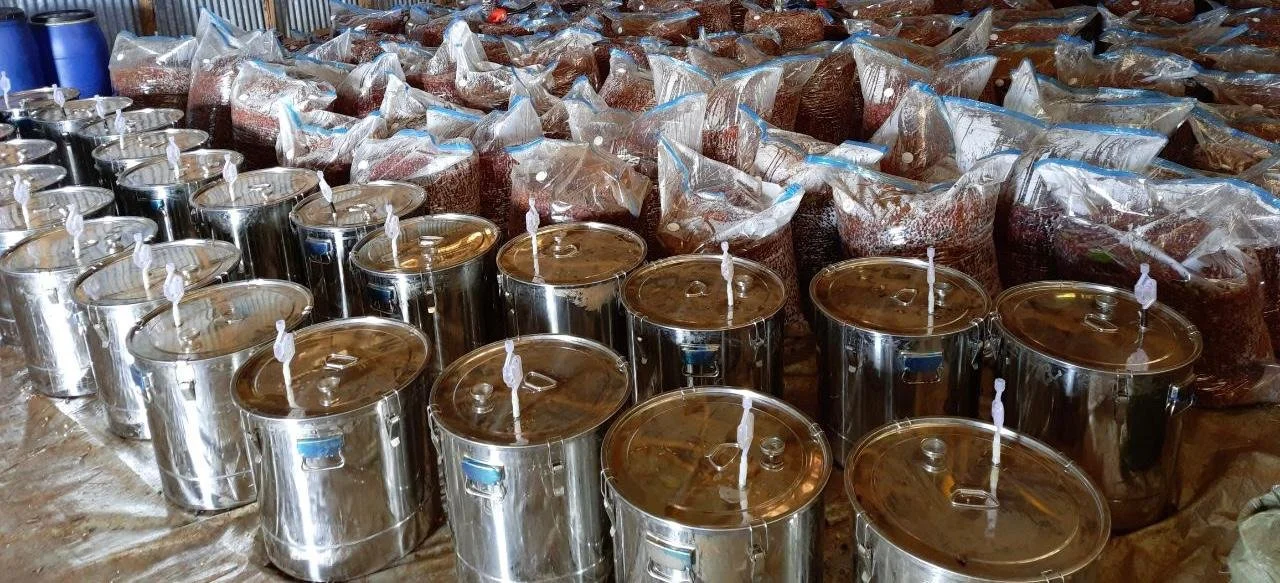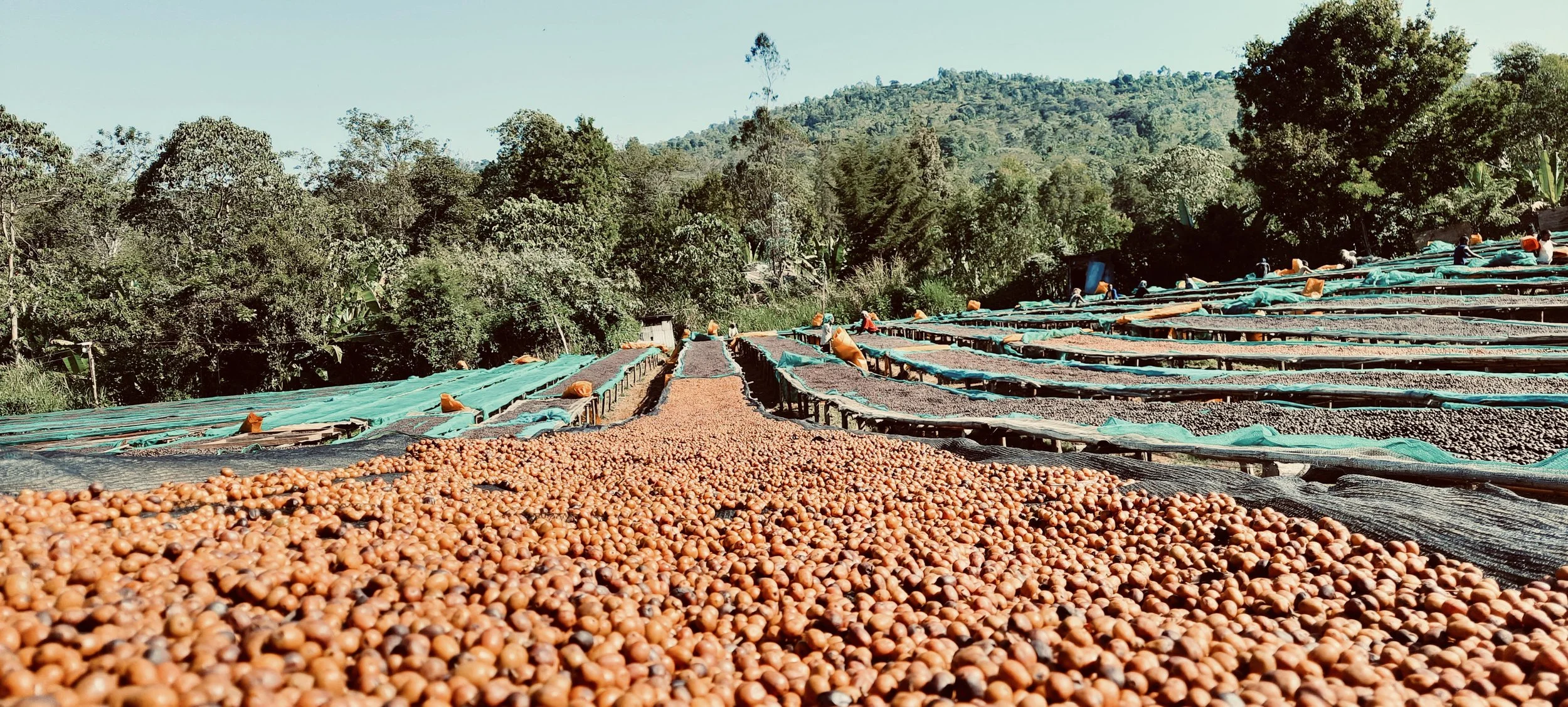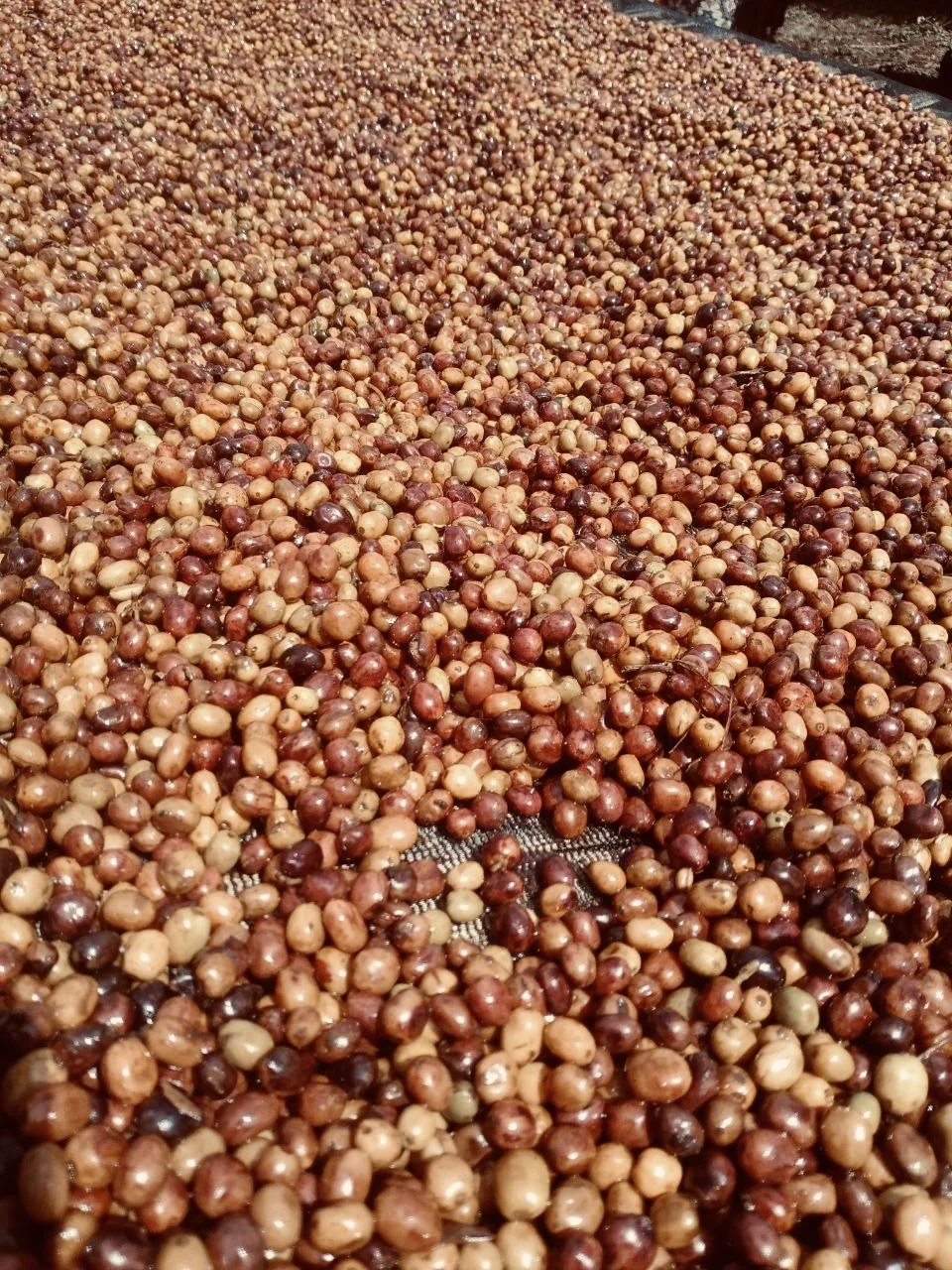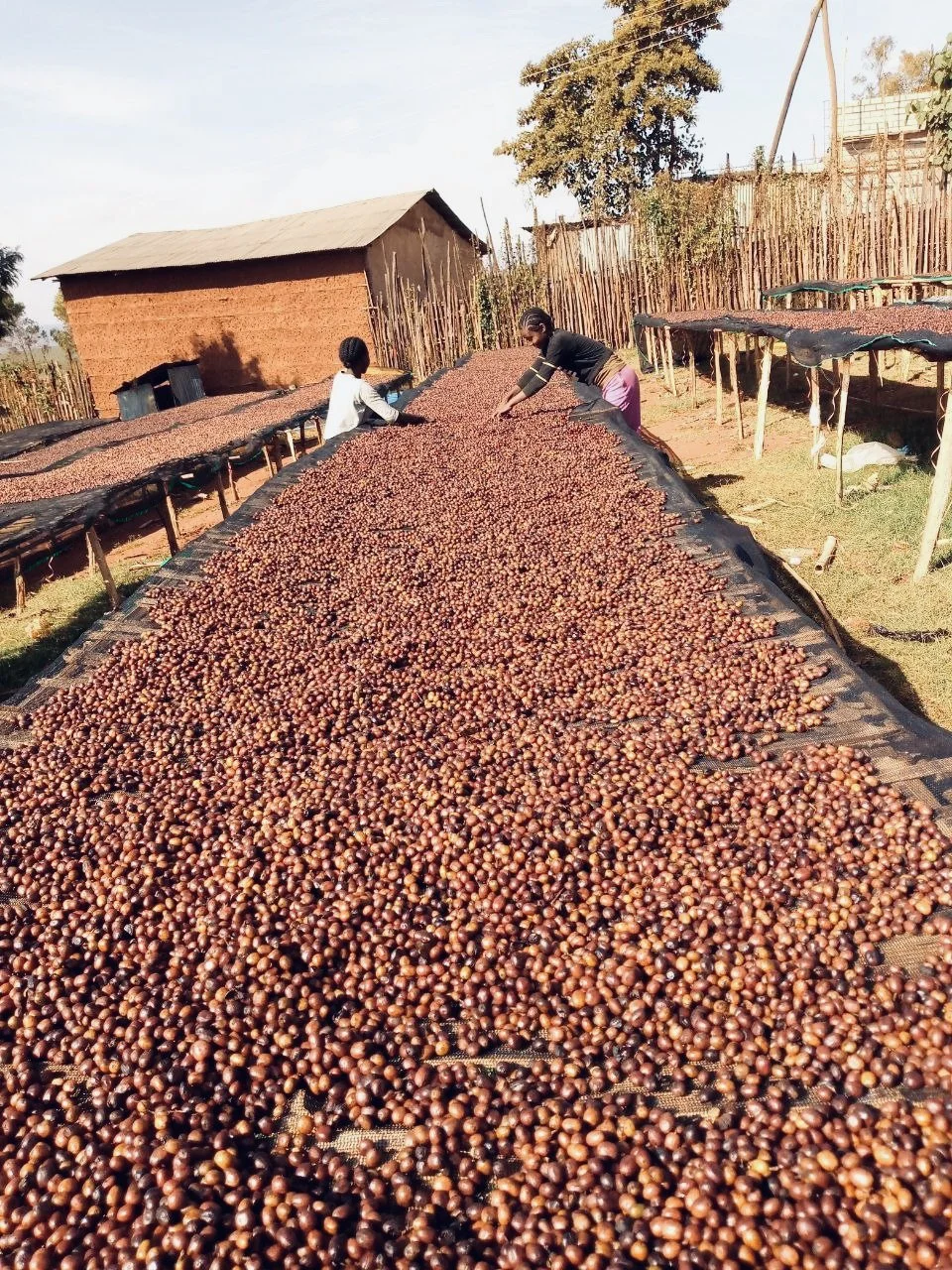Worka Sakaro Anaerobic Natural
WORKA SAKARO ANAEROBIC
Producers: Worka Chelbessa Kabele Smallholders (Worka Sakaro Washing Station)
Mill/Washing Station: Worka Sakaro Washing Station by Tracon
Bag Size: 60 Kg Grainpro
Region: Gedeb, Gedeo Zone, Yirgacheffe
Elevation: 1,970 MSAL
Grade: 1
Variety: Gibirinna 74110, Serto 74112
Process: Anaerobic Natural
Anaerobic Environment Fermentation Time: 72 Hours
Drying Time: 17 Days on raised beds
summary
Tracon’s reputation is well regarded and are no strangers among COE members globally. In 2021, Tracon chose to participate in Ethiopia’s second ever Cup of Excellence Auction and had 2 different coffees score an impressive placement in the top 20 of all the coffees submitted in the Ethiopia COE Auction. In 2021, a record-breaking number of entries 1,849 for any countrywide Cup of Excellence competition entered the competition to compete that particular year. Placing in the best of top 20 coffees produced in Ethiopia should speak volumes for itself..
This is our second year sourcing and working with Tracon Trading. From our experience over the years of sourcing from local Kebeles in and around Worka Sakaro and Worka Chelbessa, the coffees grown in these areas are nothing short of spectacular and are highly coveted around the world for their very high quality and unique flavor profiles. Add careful antiquated experimental processing to the mix and a very methodical approach to dry milling, you might have lightening in a bottle.
Tracon is a family owned business who owns a total of 30 washing stations located around Ethiopia. All experimental coffees are processed at Tracon’s own washing stations. First, local farmers and brokers who collect cherries from the surrounding kabeles of Worka Sakaro and Worka Chelbessa come to Worka Sakaro to deliver their cherries. Worka Sakaro is managed by Samuel Zergaw and he’s been spearheading and managing these experimental projects for Tracon at Worka Sakaro for the past 4 years. Samuel oversees cherry selection, post harvest production and compensation distribution directly to their local farming partners.
Tracon has developed a state of the art modern coffee cleaning and milling facility in Addis Ababa where the coffees are all transferred for final milling following the initial collection and post harvest production phase of all their coffee. The facilty is equipped with the latest Pinhalese coffee processing equipment to sort coffees by density, size and also utilize high level pieces of automated equipment like optical color sorters for final sorting. Tracon also directly supports several of the local farming communities they work with by providing in depth training on modern farm management and harvesting practices with local farmers each year. Each lot contracted with Tracon this year was done on a prebook basis prior to the coffee harvest. We believe embracing this model equips partners with the tools and resources to provide early harvest premium payments directly to farmers and to help producers mitigate and calculate risk knowing they have a secured buying partner on the other end to support their efforts.
PROCESSING
Once the cherries arrive to Tracon’s Worka Sakaro Washing Station, they are submerged in clean water to wash out any possible dirt or contamination that could affect the development of bacteria inside the fermentation tank. Once all cherries are clean and classified by their density, the heaviest cherries are selected and placed inside the fermentation tanks. These tanks were modified to have a one way relief valve added to the top of the tanks along with a hose that is placed inside a water bottle outside of the tank. The hose is placed inside the water bottle allowing the water to act as a barrier so that no oxygen can enter inside the tank and only allowing gasses to exit the tank, creating an environment free of oxygen within the tanks. After fermenting in the tanks for 72 hours, the coffee is then transferred to complete drying on raised drying beds for 17 days where the coffees are routinely raked and rotated by hand to assure consistent exposure and uniform drying during the drying phase.
JARC VARIETIES - 1974/1975 CBD RESITANT SELECTIONS
Currently the majority of coffee produced in Ethiopia is produced from three production systems: forest, semi-forest, and garden coffee. The level of variation among coffee varieties in the forest and semi-forest production systems are recognized as a higher degree of quality than garden coffee production systems. Farmers in Ethiopia have always had an interest in changing the genetic base of their varieties in different production systems in pursuit to improve coffee production and yield. The Jimma Agricultural Research Center (JARC) has made huge contributions to the global coffee community with its efforts over the past 40 years to expand knowledge through scientific research and studies in Ethiopia. In the efforts by the (JARC) to push towards revolutionizing the development of modern coffee varieties in Ethiopia they have created innovative methods to genetically combat CBD (coffee berry disease) and increase the overall efficiency in production and yield for coffees grown naturally in the forest and semi-forest production systems.
In 1971, coffee berry disease (CBD) was spreading throughout Ethiopia and likely had been around for years. Initial trials in 1972 used chemical-based fungicides to test prevention of the disease. While these proved successful, it was decided that a better solution would be to collect and use the broad genetic diversity of Ethiopian coffee to develop CBD-resistant varieties. The selection process for these varieties began in 1973 and resulted in collections from 19 locations in Southwestern Ethiopia. After collecting seeds from 639 different coffee trees originally collected in the areas of Gera, Metu-Bishari, Washi and Wush Wush for showing resistance against CBD. For 1974 and 1975 CBD resistant improved coffee varieties, if a variety name starts either with a 74 or 75 it is a selection number given to the variety and can represent a broader group of different varieties that stem from the 1974 and 1975 CBD Resistant Selection Group.
Gera Selection: 75227, 741
Metu-Bishari: 74165, 74158, 74112, 74148, 74140
Washi: 7487, 7454, 7440, 744
Wush Wush: 754
Variety Gibirinna 74110 & Serto 74112
The level of variation among coffee varieties in the forest and semi-forest production systems are recognized as a higher degree of quality than garden coffee production systems. The 74112 variety begins with “74” to indicate the official cataloging and selection in 1974. Variety 74112 originates in the Metu-Bishari forest and was released in 1979 from it's counterpart 74110 for its disease resistance and yield potential. The trees are smaller in stature and compact.
Farmers in Ethiopia have always had an interest in changing the genetic base of their varieties in different production systems in pursuit to improve coffee production and yield. The Jimma Agricultural Research Center (JARC) has made huge contributions to the global coffee community with its efforts over the past 40 years to expand knowledge through scientific research and studies in Ethiopia. In the efforts by the (JARC) to push towards revolutionizing the development of modern coffee varieties in Ethiopia they have created innovative methods to genetically combat CBD (coffee berry disease) and increase the overall efficiency in production and yield for coffees grown naturally in the forest and semi-forest production systems.
REGIONAL INFORMATION
Gedeb, Gedeo Zone
Yirgacheffe is famous for putting washed coffee on the map in Ethiopia decades ago. People fell in love with the floral and citric profiles that the washing process brought out in coffees of Yirgacheffe, and almost instantly this small town became famous. The region is home to 400 + smallholder regional coffee cherry producers.
Southern Ethiopia, and Yirgacheffe in particular can get very confusing when figuring out the geographical areas and names. Yirgacheffe is actually the name of a small town, AND the name of a small wordea (district). However, the name Yirgacheffe became synonymous for coffees coming from a much greater area than just the town or the woreda. Today, Yirgacheffee coffee is mostly from the political boundary area called the Gedeo Zone (named after the Gedeo ethnic group). Notably though, a very small amount of coffee labeled as Yirgacheffe comes from the Oromia SNNPR region that borders the western edge of Gedeo. The Gedeo Zone is broken down into 7 woredas, those are; Dilla, Dilla Zuria, Bule, Wenago, Yirgacheffe, Kochere and Gedeb.
Gedeb is the southern most woreda (district) of the Gedeo Zone, and in comparison to other areas coffee is somewhat newer to this area. Many farms here have only been growing coffee for 1 or 2 generations, and much of the coffee is only 20-30 years old. Farms in this area tend to be slightly larger than in the northern part of Yirgacheffe, but are still relatively small- averaging around 1-2 hectares, however some larger farms that are 5-20 hectares do exist.
The Gedeb woreda is home to the coffee producing kebeles (communities) Worka Chelbessa, Worka Sakaro, Banko Dhadhato, Halo Hartume, Harmufo, Gedeb Gubita, Gedeb Galcha, Banko Chelchele, and Banko Gotiti. Fairly recently, the political boundaries of Gedeb grew to include communities north of Gedeb, that were formally a part of Kochere. Those communities are: Mora Layo, Mora, Bisha, Geshe Jeba, Abel, Kedida Gubeta, and Gora Dibandi. These kebeles do not produce a lot of coffee due to their extreme elevation often over 2400 meters.
